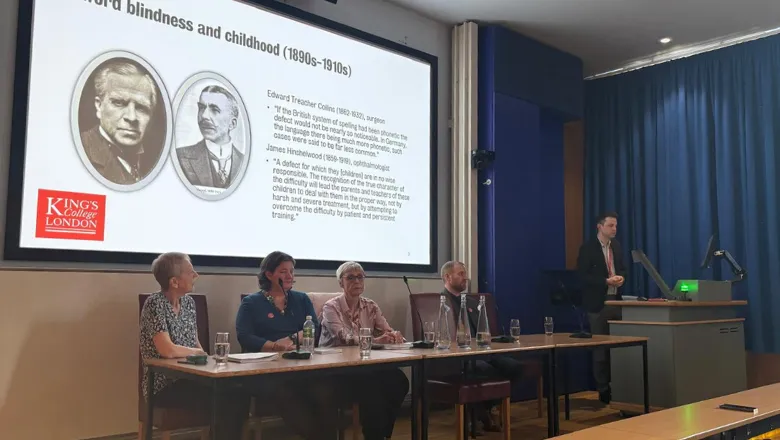Towards a new definition of dyslexia: announcement and discussion
This discussion will present the new definition of dyslexia created out of a new DELPHI study.
14 April 2025
Last week King’s College London hosted a panel of dyslexia experts who presented their research advocating for a reformed definition of dyslexia.

Supported by St John’s College Oxford, the event brought together five panelists: Dr Paul Thompson and Professor Julia Carroll of the University of Birmingham, Dr Philip Kirby of King’s College London (School of Education, Communication and Society, Professor Margaret Snowling of the University of Oxford and Caroline Holden of the SpLD Assessment Standards Committee.
The proposition for a new consensus definition comes from their recently conducted Delphi study which found that the current definitions for dyslexia are incomprehensive. In the presentation, Dr Philip Kirby commented on the history of dyslexia, noting its first mentions in the 1870s, referred to as ‘word blindness’, and emphasised the historic puzzlement and lack of understanding of the condition.
Professor Julia Carroll, University of Birmingham, later presented the existing definitions of dyslexia and their limitations, with an emphasis on what the Delphi definition seeks to cover. Professor Margaret Snowling, who chaired the event, played a pivotal role in the earlier definitions of dyslexia, and continues to champion a development of the existing definitions.
The newly proposed definition incorporates the features of dyslexia, its impact and severity as key factors in understanding the condition. Professor Carroll noted that compared to the old definitions, the new definition emphasises that dyslexia is about processing difficulties, not solely the attainment itself. She went on to mark the new definition’s focus on fluency, the necessity of a corresponding acknowledgement that other causes and factors exist, and the acknowledgment of co-occurring difficulties and secondary consequences that those with dyslexia often face.
The presentation was closed by Caroline Holden (SpLD Assessment Standards Committee) who explained the recommended pathway for assessment and support that came out of the study. She also commented on the current provisions within policy to support children and adults with dyslexia. Markedly, Caroline highlighted that the key policy that focuses on supporting students with dyslexia is in higher education, and that “there is no recent or significant legislation or policy directive regarding the assessment of dyslexia in primary and secondary schools in the UK”, except in Scotland.
Caroline described the assessment for children with learning difficulties as a ‘maze’ and explained that both parents and teachers face complications when it comes to referrals. The lack of a clear definition alongside an unsuitable assessment framework leaves many children undiagnosed and without the appropriate support to continue their learning.
The event was attended by teachers, assessment practitioners, students and also Independent MP for Leicester South, Shockat Adam, who sits on the all-party parliamentary group for special educational needs and disabilities. A rich discussion with Mr Adam resulted from the event, where the panel emphasised that policymakers need to work with practitioners and also teachers who tackle this problem upfront on a daily basis. Whilst some of his questions about handling ‘parliamentarians association of dyslexia with “woke culture”’ were met with some confusion, his general acumen and interest struck the panel with hope that their study could result in the collaboration with government that they had wished for. The conversation continued at a networking reception held in the Somerset Room on Strand Campus, funded by St John’s College, Oxford.
The new definition and findings from the study can be found in the set of papers published at the end of May.
This discussion will present the new definition of dyslexia created out of a new DELPHI study.